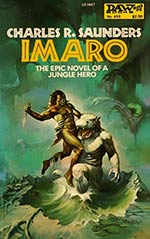
![]() bazhsw
bazhsw
3/19/2024
![]()
This book felt like quite a guilty pleasure to enjoy. It's been a long while since I have read any sword and sorcery type novels and it was quite fun seeing our title hero fight and kill his way through the book in a kind of coming of age story (but not really!)
Imaro's story starts as a young boy as his mother asks her tribe to adopt him since due to her previous taboo behaviour she will be banished when he is five. Imaro's story is of his growing up in the Ilyassai and eventually leaving to find his way in the continent of Nyumbani and his transition into a heroic manhood.
The novel was originally published in 1981 and was composed of three short stories Saunders wrote in the 1970's. The novel definitely reads as a collection of stories although there is a kind of narrative stitching the book together. In 2006 the novel was revised and republished and it is this version I have read. In this version the story 'The Afua' replaces 'Slaves of the Giant-Kings' which Saunders withdrew due to it's close parallels with the Rwandan genocide and the story 'Betrayal in Blood' replaces 'City of Madness' which appears in the revised sequel Imaro: The Quest for Cush. I really want to read 'City of Madness' as in Nyumbani Imaro finds a 'lost tribe' of light skinned people who are using sorcery to enslave the Nyumbani population. It's not hard to see what Saunders is drawing the attention of the reader to here!
I first read Saunders earlier this year when I enjoyed a short story he wrote set in Nyumbani in the collection Dark Matter: A Century of Speculative Fiction from the African Diaspora. He also wrote a brilliant essay in that book recommending black people read and write science fiction and fantasy, making superb comparisons not just to the racism of 'historical' authors such as Edgar Rice Burroughs and their fetishisation of 'darkest Africa' but also how modern writers consider Africa as an 'alien' landscape.
So what is there to like about this book? If you like the sword and sorcery genre then you're going to love this. Imaro is basically stronger and faster and braver than everyone so he can fight and kill anything he wants (and get the girl in the process). At times it comes across as a little dumb because even when he is in peril you kind of know he is going to punch his way out of things. That's not to say he is a walking fighting machine. You do get to hear his thoughts, his fears, and his own internal vulnerability. It's fun to read, the chapters are short and it's a book I struggled to put down.
Where Imaro really comes into it's own is in it's wholly realised continent of Nyumbani which unlike 95% of fantasy has an African flavour rather than an medieval European one. The world is described beautifully. The cultures and tribes Imaro encounters are fully fleshed out and distinctive and feel like 'real people' rather than people inserted into a setting. The first story is wholly set on the plains and grasslands of the Tamburure - Imaro knows of other tribes and peoples who live in the region but he hasn't experienced hills, mountains, jungles, stone buildings, the sea, the river etc. The whole world is the Tamburure and yet it all feels like a contained land. There are distinctions within the Ilyassai tribes, and the other people who live there like the Tukhana and Zamburu.
The first story is the best as we see the Ilyassai culture through a child's eyes and is a coming of age story as Imaro learns who he is, and who he is not. It is quite sad in some ways because he is Iiyassai but they do not consider him to be. Throughout the novel there is a look back to what his identity and culture is, and is not.
In later stories Imaro leaves the plains and Saunders captures beautifully Imaro's wonder as he sees different landscapes, cultures, animals and people other than his own. Considering the breadth of the novel is a continent, everyone he encounters feels different and there is a sense of a wholly realised, living continent. I mention this because in the UK when I was a child and learning about the world it often seemed like Africa was presented as a single country and a single people. It feels perversely racist to think this now but in my childhood that is how I, and presumably others thought. I guess in a lot of Afro-fetishism and othering that still persists today.
I also like to think that this book is firmly in the tradition of Lovecraft (eldritch horrors and nameless gods) via Robert E. Howard's Conan without the shocking racism of Lovecraft and other pulpy novelists of the 20th century. That's not to say the novel isn't problematic. Saunders indicates that women fight with Imaro in one of the groups he is in, and Imaro's mother is clearly a significant figure (though off screen past the first chapter). He has a couple of love interests but they seem to be quite one dimensional - beautiful, there to be caught in peril - even if there is a nod to them fighting or having an opinion. Maybe that's in the tradition of 'sword and sorcery', maybe I'm expecting more from stories written sometimes over fifty years ago.
There are probably about fifty series I have started and never finished, but I hope one day I go back to Imaro. I had fun with him in his world and I am interested in what happens to him.